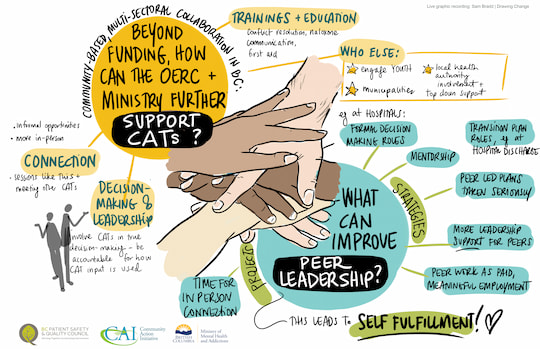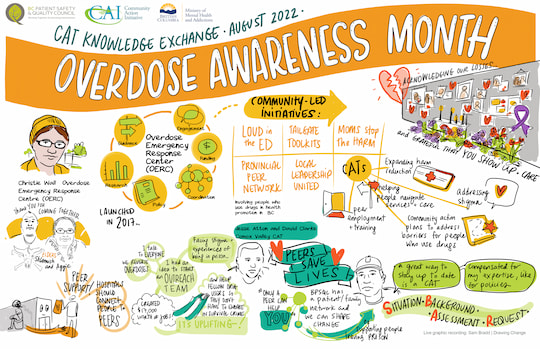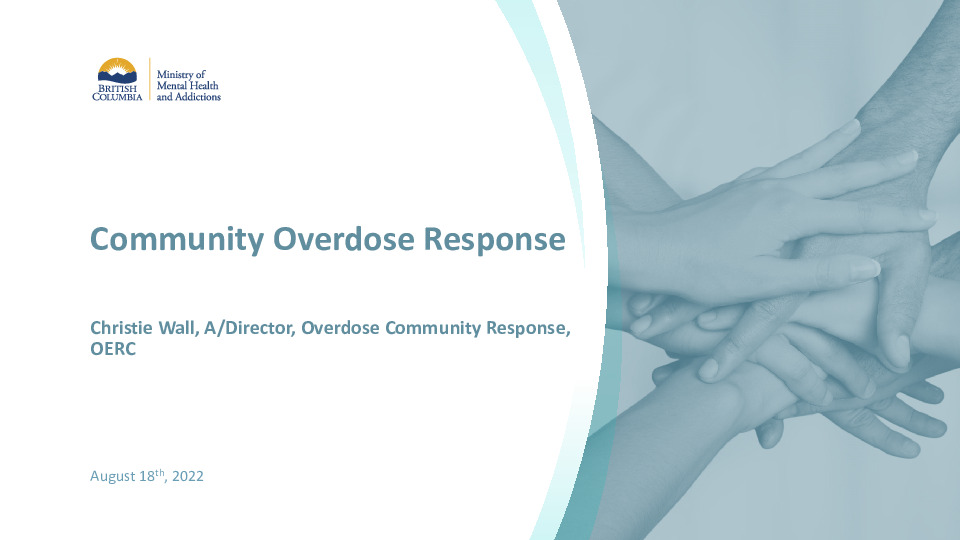On August 18, 2022, we hosted a 1-hr Overdose Awareness Month Event, including two peer speakers from the Comox Valley CAT!
Jesse Atton is widely involved from local to national discussions and working groups to advance peer work. He’s part of a provincial committee that is actively engaged on hiring, training, and equipping peers, as well as policy development for peer staff.
David Clarke started Comox’s first peer-to-peer outreach project, Comox Valley Street Outreach, with the support of AVI Health and Community Services. David continues to mentor peers, provide meaningful employment, build capacity and deepen connections in the community.
In addition, Christie Wall, the A/Director of Overdose Community Response with the Overdose Emergency Response Centre (OERC) presented, highlighting the achievements of the CATs as well as other programs in the Overdose Community Response portfolio. There was space for small group discussions for people to reflect and share their experiences & ideas.
Peer Resources & Opportunities – Jesse Atton, Comox Valley CAT
CAPUD Peer Work Opportunities (Canadian Association of People Who Use Drugs)
Scroll down on their website to sign-up and become a member. Also, feel free to connect with the program manager Matt.bonn@capud.ca to discuss your interest.
BC Patient and Family Partner Network (BC Mental Health & Substance Use Services)
Peer consultant work, through one-off engagements or project committees. Contact nassim.pezeshkzad@phsa.ca to be put on the newsletter email list.
SBAR (Situation, Background, Assessment, Request/Recommendation)
An effective communication tool, used extensively in hospitals and ER triages. When working with local physicians and providers, it can be valuable to move from the situation to a specific request to further action.
CAT Peer Project: What is challenging in your hospital environment?
Reach out to Jesse Atton (Jesseay@gmail.com) to provide input and discuss future peer projects!
Hospital peer support role, Overview
- Staying positive, listening and asking questions.
- Transferring important information, being certain it is included.
- Assuring basic needs are met, such as food, water, warm blankets and showers. As well as going out for cigarettes.
- Non-opioid pain medication, such as Tylenol for tooth pain or Imodium for withdrawal.
- Preferences for admittance and community treatment.
- Arranging visitation.
- Streamline and assist versus demanding of nurses and doctors. Keep communication brief and specific.
Additional tips for peers working with nurses & physicians in the community
- Name drop similar connections.
- Learn how they talk and what they are curious about.
- Provide background history and future appointment information.
- They can’t fix everything, but have specific requests from the visit & interaction.
- For bigger picture issues, ask for a “referral to social work” if the person you are supporting is being admitted.
Small Group Discussion Notes – August 18, 2022
CAT Knowledge Exchange – August 18, 2022 Breakout Room Discussions
CAT Knowledge Exchange – August 18, 2022 Breakout Room: Peer-Reflection
Graphic Recordings – August 18, 2022
CAT Knowledge Exchange – Graphic Recording 2 – August 18, 2022
CAT Knowledge Exchange – Graphic Recording 1 – August 18, 2022
These two graphic recordings summarizes the 1-hour event on Aug 18, 2022. Recording by Sam Bradd from Drawing Change.




